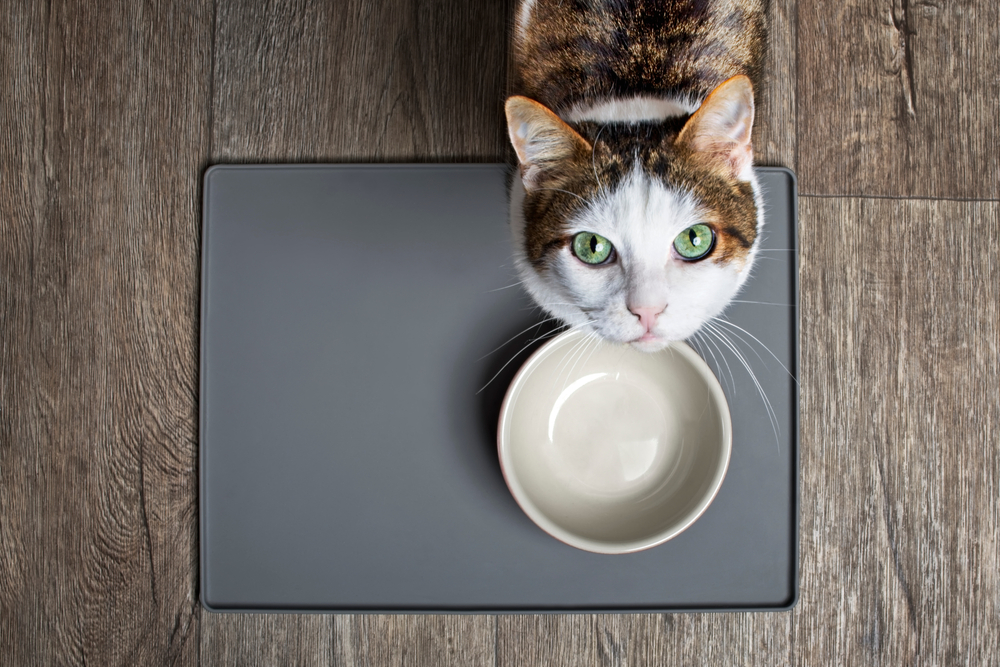Should you change your cat’s food to add variety in their diet? Are there other reasons to change your cat’s food? Cat owners know that cats have very specific tastes and often want only a particular food. Then – as if out of the blue – they can decide they no longer adore their food like they once did. In this case, you most likely will have to change your cat’s food in order to get them to eat normally, or face a battle of wills with your cat. It is very important to make sure your cat eats as they can experience a life threatening disease called hepatic lipidosis if they go more than a day or so without a good meal. This is especially true of overweight cats.
Other cats become disinterested in their food every few months. Some turn their nose up at kibble, and we hear about the woes of cat owners trying to feed a picky cat. Union Lake Veterinary Hospital wants to cover the topic of if and when to change your cat’s food and why.
Common Reasons for Dietary Change
In addition to finicky food preferences, there are times in your cat’s life when a change in nutrition is for their best health. As a cat ages, they will sometimes require a change in level of nutrition and ingredients that promote health and deter medical conditions. Some cats even have allergies to specific ingredients and will need a specialty diet.
Age – Age is one of the primary factors in transitioning your cat from one food to another. Life stage changes, such as when your cat goes from adulthood to geriatric, will need such a change to their nutrition.
Disease and Other Conditions – Diabetes and kidney disease, among other conditions, will call for a prescription diet for your cat. These medical diets are balanced for the nutritional requirements that offer support for an ill pet and increase their overall wellness while reducing the effects of the illness.
Allergies – If your cat is diagnosed with food allergies, you can also expect a change in their diet. Many cats are allergic to specific ingredients like beef, fish, chicken, and dairy. Some cats have certain food sensitivities as well, such as with the extra ingredients like food dyes and preservatives which may make a change in food necessary.
These are three good reasons to change your cat’s food. Discuss with your veterinarian for the optimal diet for your cat and their life stage and health. But there are other reasons to change your cat’s food.
Food Trends and Preferences
Pet owners may be attracted to new trends in cat food diets–raw, organic, grain-free, and boutique/exotic diets are in high demand. This can be a problem, though, without a clear understanding of your specific cat’s dietary needs.
Since cats are carnivores, a grain-free diet is attractive since cats require their main staple to come from animal protein. But, any change in diet to something out of the ordinary can have serious repercussions, ranging from digestive upset to an imbalance in your pet’s nutritional requirements. Check with your veterinarian first before jumping to a new type of food.
Picky Eaters
A common complaint with kitties is that they’re too quick to grow bored with their food. These cats may prefer a variety of flavors or brands. Generally, a change in the brand or flavor is fine, as long as it meets the requirements for your pet’s health and life stage.
Some cats have other preferences. Some prefer kibble or dry food while others love wet, and some do well with a combination. You will likely need to try out a few options to see which forms, flavors, and brands your cat likes most.
How to Change Your Cat’s Food
To avoid digestive problems, it is best to change diets slowly. Switching to a new food can bring about vomiting, diarrhea, and gas when not done gradually. The first few days, make sure the ratio of the old and new diet is 75% old and 25% new. On day 4, you can divide the old and new, 50:50, and on days 7-10, 75% should consist of the new food. On day 10, you can give your pet their new food without the old mixed in.
Should you change your cat’s food? There are times when it makes sense nutritionally, and others when it is purely a matter of pleasing a finicky cat. We don’t recommend changing food without careful consideration and without a transition period. The proper nutrition is key to your pet’s health and well-being. And keeping kitty happy is key to keeping your cat happy and well-fed. Please contact us if you have any questions about your best-pawed pal’s dietary needs.

